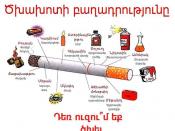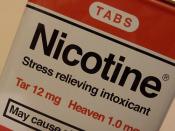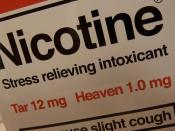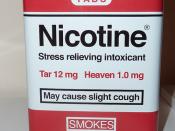In this class four people had lost a loved one because of smoking. Another ten people in this class often inhale second hand smoke. Why should you leave a loved one die or even worse, why should you let them poison you with their sick habit? I used to smoke for eleven years, since I was eleven years old, and I never thought of the dangers caused by smoking. Finally I quit smoking four months ago. The first thing I noticed was the deeper breaths I could take, the cleaner smell of my clothes, my bedroom, and my car. I really want to thank my girlfriend Katerina because she is the reason I stopped smoking. My survey shows that only two people smoke in this class, but I am sure we all have a loved one, relative or a friend that smokes. I am going to discuss several diseases, statistics, and ways that you can help somebody to quit smoking hoping that I will persuade you to go home and make that smoker you know to live longer.
First I would like to start with what nicotine is. Nicotine is a naturally occurring colorless liquid that turns brown when burned and acquires the odor of tobacco when exposed to the air. Nicotine is a high powered stimulant and one of the most addictive drugs. In fact, the Surgeon General concluded that nicotine addiction is comparable with the addiction of heroin or morphine. When a cigarette is smoked, nicotine first enters the lungs and bloodstream. Within seven seconds, about 15 percent of the nicotine travels directly to the brain. When it arrives, the brain triggers a number of responses in the body, including an increase in heart rate and breathing. Each puff provides the smoker with a dose of nicotine. Smokers sustain a continuous dose of nicotine throughout the day by smoking more when the nicotine levels in the blood are decreasing and less when they are stable or increasing. Cravings occur approximately every 20-30 minutes.
Did you ever wonder what's in the cigarette that millions of people love to smoke every day? Well, there are over 4000 toxic substances in a cigarette. Some of these are: Arsenic (found in rat poisons), Acetic acid (found in hair dye developer), Ammonia (found in household cleaners), Benzene (found in rubber cement), Butane (found in lighter fluid), Carbon Monoxide (found in car fumes), Hydrazine and Methanol (both found in rocket fuel), Tar (found in roads), Formaldehyde (used to embalm dead bodies), and thousands more. These toxic substances go in the lungs and blood of our friends and relatives. The result of this unhealthy habit is different types of cancers.
The center of disease control and prevention reports that cigarette smoking is responsible for 30% of all cancer deaths. Smokers not only die of lung cancer but also of cancer of the mouth, throat, esophagus, bladder, kidney, cervix, and leukemia.
Now I am going to talk about different diseases that smoking could cause. Let's start with bronchitis. When a smoker has bronchitis, his/her bronchial tubes become inflamed or irritated. They produce too much mucus. This mucus blocks the tubes, and the smoker coughs a lot. Emphysema is a lung disease that has no cure. A person with this disease has difficulty breathing because the walls of the small air sacs in the lungs are being destroyed. This makes big air surfaces. A person with emphysema gets tired very easily. The person uses so much energy just to breath. Imagine getting tired of breathing. As the disease gets worse, the person cannot breathe in enough oxygen from the air and has to breathe through tubes attached to an oxygen tank. Heavy smokers also increase their chances of getting Peripheral Vascular Disease (PVD). In this disease the arteries that lead to the arms and legs keep getting narrower. As a result, not enough oxygen-rich blood goes to the arms and legs. It also makes it harder for the body to fight off infections. When an arm or leg is hurt, it cannot heal well. If the arteries get closed and no blood gets to a limb, the person gets gangrene. The limb dies and must be cut off.
According to The National Institute on Drug Abuse on average, someone who smokes a pack or more of cigarettes each day lives seven year less than someone who never smoked. That statement gives us one more reason why we should help our loved ones to stop smoking. I don't think any of us would like to see a friend or a relative die sooner than they have to. To avoid this from happening, we should help them quit. If you want to help them, first you should know how to make them quit. According to Daniel McMillan in his book "Teen smoking, understanding the risk", smoking is a physical addiction and a psychological habit. This is what makes it so difficult to stop. The nicotine in tobacco smoke is addictive. The pleasure of smoking for regular smokers is really the relief of satisfying the body's craving for nicotine. Smoking also becomes a habit. It becomes associated with various emotional occasions, situations, and events. For some people, the habit can be harder to break than the physical addiction. It is better to give up completely rather than cut down slowly. Nicotine is eliminated from the body as quickly as 48 hours after the last cigarette, so the withdrawal symptoms tend to be more intense for the first 2- 3 days. Trying to quit slowly just makes the withdrawal process longer. The nicotine replacement therapy is a way for a person to quit smoking. Nicotine replacement therapy products provide a supply of nicotine at a controlled dose to help reduce withdrawal symptoms. These products can be used in different forms such as chewing gum, patches applied to the skin, tablets or lozenges, and nasal spray. The withdrawal symptoms are: Mood swings, Weight gain, Insomnia, Coughing, Constipation, Headaches and dizziness, Difficulty concentrating, fatigue. Laurence Pringle mentions some "Quit tips for smokers" in his book "A risky business: smoking". Some of the tips that he mentions are to decide positively that you want to stop. Try to avoid negative thoughts about possible difficulties. List all the reasons why you want to stop. Every night before going to bed, repeat one of the reasons ten times. You should know what to expect. Have realistic expectations-stopping isn't easy, but isn't impossible either. Understanding that withdrawal symptoms are temporary and are healthy sings that the body is repairing itself from its long exposure to nicotine. Throw away anything that has to do with cigarettes (ashtrays, lighters, tobacco). Clean all your clothes to rid them of the smell of smoke. Develop a clean, smoke- free environment around yourself. Stay away from other tobacco users because they can weaken your resolve. Alcohol can weaken your willpower. Avoid it. Refuse to allow anything to change your mind.
I did the research, you do the job. Just remember it can be done. According to the Center of disease control and prevention more than 3 million people in the United States stop every year, and in England There are now 13 million ex smokers. Go home and pass them the messages that you got from here today. I am sure they will listen to you. They can do it- I did it. Go and save them.






WOW
Its outstanding
3 out of 3 people found this comment useful.